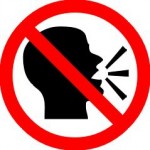Does shouting work for you?
 A New York Times (NYT) Sunday article featured Mario Batalli, chef, cookbook author, television personality talking about working in his kitchen. His philosophy and communication style as leader is that you do not have to shout to work with each other.
A New York Times (NYT) Sunday article featured Mario Batalli, chef, cookbook author, television personality talking about working in his kitchen. His philosophy and communication style as leader is that you do not have to shout to work with each other.
The culture in the kitchens of many restaurants is to yell to communicate. The high pressure, time sensitive, noisy environment lends itself to this.
On Tuesday, August 28, acclaimed chef, Charlie Trotter, was featured in the Chicago Tribune because his restaurant is closing on Friday. He discussed what he did to change the atmosphere and talked about chefs who became famous but may have paid a high price for that fame.
So, here we have two celebrated chefs, successful leaders in their own field and businesses, with two different styles. One style was forged twenty some years ago and the other is relatively current.
The questions to answer are what works best for you, does it benefit you and do you learn from it?









